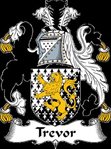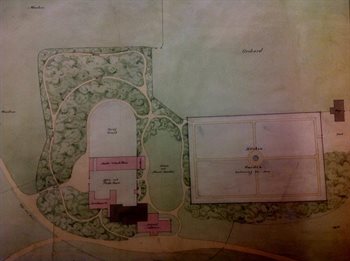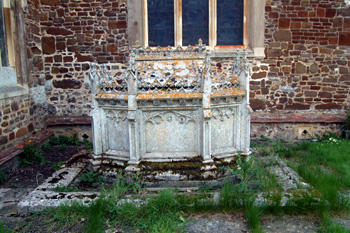The Trevor Family of Tingrith
This article was written by Chris Schuster

The Trevor family arms
Robert Trevor, the great-grandson of Baron Trevor of Bromham through his mother, inherited wealth and property from his mother’s Trevor cousin, Viscount Hampden, who died childless. Robert’s father, also Robert Trevor, was from a different branch of the Trevor family, and was Receiver General for the Post Office. It was the inheritance from Viscount Hampden that funded the purchase of the Tingrith Manor estate from John William Willaume in 1810.
Letters from Robert and his wife, Mary, to her brother, Rev. Edmund Williamson of Campton near Shefford, give a good idea of the life they led in Georgian and Regency England.
In 1794 Robert joined the First Regiment of Cavalry Fencibles. The Fencible regiments, a sort of Napoleonic Home Guard but with a higher rank than the Militia, were raised from volunteers during a time of great turbulence in Europe when there was a real fear that the French would invade Great Britain. Robert’s regiment regularly patrolled the South Coast and it was from Plymouth that Robert announced less than a year after he joined, that he was going to resign his commission under pressure from his mother and settle down. He tells his future brother-in-law he knows: "of no one more likely to make me happy than your Sister, I have not formed to myself any romantic ideas of happiness, angels etc, but sincerely trust I shall not find myself among the most unhappy".[M10/5/885]
Meanwhile Mary writes to her brother thanking him for his approval of her engagement but saying that, although she is delighted to be marrying Robert, she can’t stop crying at the thought of leaving her family and seems very conscious that she is moving from a "very humble sphere" [M10/5/936].
Robert and Mary initially rented Flitwick Manor, originally for £30 per annum and from 1802-1816 for £40 per annum. Robert had great plans for extensions there and he agreed with the owner, George Brooks, that they should share the costs for major renovations but by March 1808, Brooks was complaining of the cost: "Having laid out already more than £1,100 for Mr Trevor great part of which was not necessary but in which I acquiesced…. and besides I do not want a new Garden, Servants' Hall or Wash house nor the Housekeeper's Room or Coach House be made better".
Shortly after this, Robert bought the Tingrith Manor estate. In 1812 he made sure his peace would not be disturbed by arranging for the road from Woburn to Westoning, which ran straight through his parkland, to be stopped up. Traffic would be diverted through Tingrith village and then follow the “New Road” which would link the High Street (called Watery Lane at the time!) from the corner by Manor Farm back up to the Westoning Road.
In 1814 he carried on with his building dreams by drawing up plans to extend and alter Tingrith House and its grounds.

Tingrith House plan [Z133/3]
Incorporated into the grounds was an aviary which was broken into in 1818. Robert had just got hold of a pair of red legged partridges from Paris, which were still quite rare in England, and these were stolen as well as a pair of silver Chinese pheasants and a variety of ornamental pigeons. He announced in the newspaper that steel traps and steel guns were now set up in his woods, plantations and premises.
Robert’s letters show that like many men of his class at that time, his main passions in life were hunting, shooting and fishing. His name appears in the Game Duty lists, as Robert Trevor of Flitwick from 1796 to 1816 and of Tingrith from then onwards. Mary’s letters indicate that when he was actually too unwell to get on his horse she could not leave the house because he demanded so much of her attention. Her nerves were severely affected! Robert’s health was a frequent topic in his letters; he complained of general malaise, gout and even a groin strain from chasing an "unfortunate timid hare". It seems his general ill-health was not improved by leaving Mary and the children at home and moving to an hotel in Covent Garden for a change of air/scene. Luckily, his ailments were not serious enough to stop him dining out and visiting the Opera, nor from more shooting!
Although Robert owned several farms, he was very much a "gentleman farmer" relying on his brother-in-law for advice and practical help. He did however act as a magistrate for many years, and was part of the committee which decided to build a new poor house or workhouse in Flitwick, to be built using £150 borrowed from Joseph Gibbons of Tingrith which would be repaid out of the Poor Rate. He also commanded the Ampthill Troop of Yeomanry which met every Friday afternoon for drill practice and was to ‘serve as required’
The year after their marriage, Robert and Mary had a son who unfortunately did not survive. The following year their first daughter, Mary, was born and two more daughters followed, each of whom inherited a third of the manor when Robert died in 1834. None of the girls married, although the youngest had received an offer of marriage from Mr Lee, a lawyer. Robert refused his consent on the grounds that the young man had no proper residence, living in Doctors’ Commons. This was a society of lawyers practising civil law in London which had buildings with rooms where its members lived and worked. Mary wrote that Lady Hampden, Robert’s titled and wealthy relative, was also involved in the decision. Shades of Pride and Prejudice!
As young ladies of the Regency Period, Mary, Elizabeth and Catherine Trevor, the Misses Trevor, were taught needlework, drawing and music. They were talented, intelligent women who tried to live up to their strong Christian faith and worked hard to support their tenants. They built Tingrith School and funded its running, they built a Club Room (the Village Hall) to be used for meetings, readings and entertainment and their newly extended gardens of TIngrith House were used for village fetes and cricket matches as well as for their own pleasure. In the 1860’s when work for agricultural workers was hard to find, they reportedly paid for 112 villagers, half the population of the village, to emigrate to Canada, although the census information of the time doesn’t show a huge drop in the village population. At that time emigration to the New World was an innovative and no doubt frightening venture and as well as paying for their tenants’ passages, the Misses Trevor provided them with new clothes and money to support themselves when they arrived in Montreal. Nearly all the emigrants stayed and prospered there, founding Tingrith colony. In 1892, Mr William E. Bear compiled a report for the Royal Commission on Labour on the lives of the agricultural labourers in villages of the Woburn Union: Tingrith was described as a ’model village’
Elizabeth kept a shop at Tingrith House which sold groceries, medicines and drapery. She would open at all hours of the day for her poorer neighbours and sold coal twice a week from a shed. The ladies had the Church, which had bricked up windows and walls green with mould, restored to their own design and their concern for their tenants’ mortal souls was evident in the rules that they set up for the rental of allotments: attendance at Church every Sunday was compulsory.
![Rules for Tingrith Garden Allotments [SFM 3/274]](/CommunityHistories/Tingrith/TingrithImages/Garden-allotments196x299.jpg)
Rules for Tingrith Garden Allotments [SFM 3/274]
The Misses Trevor were generous employers, giving their butler, Mr Manning, a 73 acre farm in Biddenham after serving them for over 30 years, and many of the Misses Trevor’s servants are buried in Saint Nicholas’ churchyard. But not all the servants were happy. In 1846 their coachman William Mann drowned himself in the pond. It was reported that he was suffering from melancholy as being coachman was too much for him and he wanted to go back to being a footman again.
Elizabeth died in 1866 after a protracted period of suffering, followed five years later by Catherine after a year’s lingering painful illness. Newspaper reports refer to Catherine’s constant kindness and unobtrusive virtues. Mary survived another twelve years, dying peacefully. The funeral procession from Tingrith House was long, including all the tenants and parishioners following in twos after the family and friends. The coffin bearers included Gurneys and Brinklows, members of old Tingrith families who had been in the village for many generations. The Misses Trevor were buried with their parents in the family vault next to the Church porch.

Trevor family vault 2009
On Mary’s death in 1883, the Tingrith Manor estate, together with the manor of Little Hampden also owned by the Trevors, passed to the son of their father’s cousin, William Wilberforce Battye, Rector of Hever in Kent. Tingrith House was rented out and in 1894 the contents of thirteen bedrooms, the dining room, the drawing room and hall were transferred to the Village Club room for sale.
Rev. Battye's widow assumed the name of Trevor in addition to that of Battye by royal licence in 1890, when their son Captain Charles E. Trevor-Battye became Lord of Tingrith Manor on the death of his father. Captain Trevor-Battye served in the Zulu war with the Natal Native Contingent, was decorated for his part in the decisive final battle at Ulundi in 1879, and married a lady from Capetown in 1902. As the Trevor-Battyes had homes elsewhere, they rented out Tingrith House and in 1892 they put the 1113 acre estate on the market. Only half the estate was sold, for £15,000 including timber. The house and remainder of the estate was rented out again.
Captain Trevor-Battye and his new wife moved into the Manor in 1902 and they carried out their duties towards the village with the generosity the village was now used to. On Christmas Day they continued the tradition of entertaining the women and children of the village with a tea and a Christmas tree with presents in the afternoon. The men were entertained later, presumably when they had finished work. To celebrate the arrival of Capt.Trevor-Battye’s son and heir, Hugo, in 1904 a large marquee was erected in front of the House and the whole village sat down to an ‘excellent spread’. Sports were held with ‘handsome prizes’, there was music in the afternoon and dancing in the evening to a Quadrille Band from Luton and the celebrations finished with a firework display.
In 1907 the Captain cut the first sod of Toddington Rifle Range of which he was president for several years but by 1911 the Trevor-Battyes had moved to their other estate in Little Hampden and once again Tingrith Manor estate was put up for rent. The house and estate were finally sold in 1918 and the Trevor family ceased to be Lords of Tingrith Manor.